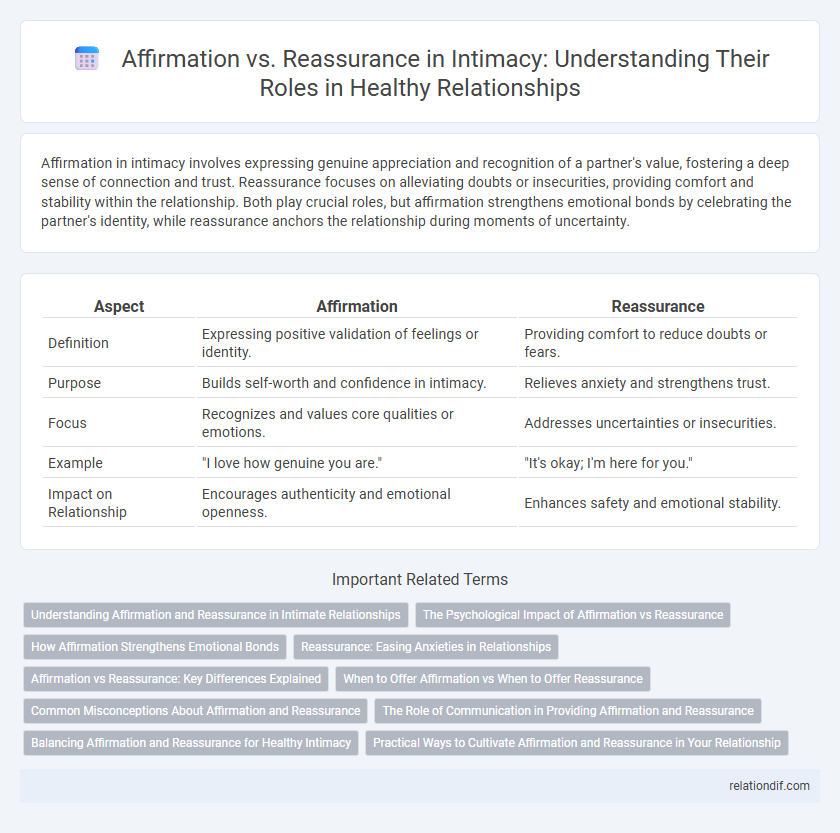Affirmation in intimacy involves expressing genuine appreciation and recognition of a partner's value, fostering a deep sense of connection and trust. Reassurance focuses on alleviating doubts or insecurities, providing comfort and stability within the relationship. Both play crucial roles, but affirmation strengthens emotional bonds by celebrating the partner's identity, while reassurance anchors the relationship during moments of uncertainty.
Table of Comparison
| Aspect | Affirmation | Reassurance |
|---|---|---|
| Definition | Expressing positive validation of feelings or identity. | Providing comfort to reduce doubts or fears. |
| Purpose | Builds self-worth and confidence in intimacy. | Relieves anxiety and strengthens trust. |
| Focus | Recognizes and values core qualities or emotions. | Addresses uncertainties or insecurities. |
| Example | "I love how genuine you are." | "It's okay; I'm here for you." |
| Impact on Relationship | Encourages authenticity and emotional openness. | Enhances safety and emotional stability. |
Understanding Affirmation and Reassurance in Intimate Relationships
Affirmation in intimate relationships involves expressing genuine appreciation and recognition of a partner's qualities, fostering emotional safety and deepening connection. Reassurance addresses insecurities by providing comfort and reinforcing trust during moments of doubt or anxiety, stabilizing the emotional bond. Understanding the distinction between affirmation and reassurance enhances communication, promotes vulnerability, and strengthens relational intimacy.
The Psychological Impact of Affirmation vs Reassurance
Affirmation enhances self-worth by validating intrinsic qualities, fostering long-term emotional resilience and secure attachment within intimate relationships. Reassurance primarily addresses immediate anxieties, offering temporary relief but potentially cultivating dependency and insecurity when overused. Psychological studies reveal that affirmation contributes to sustained confidence and emotional stability, while excessive reliance on reassurance may undermine autonomy and deepen relational anxiety.
How Affirmation Strengthens Emotional Bonds
Affirmation strengthens emotional bonds by consistently expressing genuine appreciation and recognition, which fosters trust and deepens connection between partners. Unlike reassurance, which addresses temporary doubts or fears, affirmation builds a foundation of positive regard that reinforces self-worth and mutual respect. This ongoing validation enhances intimacy by creating a safe emotional space where individuals feel truly valued and understood.
Reassurance: Easing Anxieties in Relationships
Reassurance in relationships plays a crucial role in easing anxieties by providing consistent, empathetic communication that addresses fears and insecurities directly. Effective reassurance fosters emotional security, helping partners feel valued and understood, which strengthens intimacy and trust over time. Regular reassurance reduces stress hormones like cortisol, promoting a healthier, more connected partnership.
Affirmation vs Reassurance: Key Differences Explained
Affirmation in intimacy involves expressing genuine appreciation and acknowledgment of a partner's worth, fostering a sense of security and validation. Reassurance focuses on alleviating doubts and fears by providing comfort and confirming commitment during moments of uncertainty. Understanding these key differences enhances emotional connection and supports healthier communication within relationships.
When to Offer Affirmation vs When to Offer Reassurance
Offer affirmation when your partner seeks recognition of their qualities or achievements, reinforcing their self-worth and confidence. Choose reassurance during moments of doubt or anxiety, providing comfort and stability to alleviate fears or insecurities. Understanding these emotional cues fosters deeper connection and enhances intimacy by meeting your partner's specific needs.
Common Misconceptions About Affirmation and Reassurance
Affirmation is often misunderstood as mere reassurance, but it fundamentally differs by validating feelings rather than temporarily soothing doubts. Common misconceptions confuse affirmation with simple compliments or empty praise, overlooking its role in fostering genuine connection and self-worth. Reassurance typically addresses anxiety or uncertainty, while affirmation supports identity and emotional authenticity in intimate relationships.
The Role of Communication in Providing Affirmation and Reassurance
Effective communication plays a crucial role in providing both affirmation and reassurance within intimate relationships by conveying understanding, validation, and emotional support. Affirmation involves expressing appreciation and recognition of a partner's feelings or qualities, which strengthens emotional bonds and self-esteem. Reassurance focuses on alleviating doubts or fears through clear, empathetic dialogue that reinforces trust and security.
Balancing Affirmation and Reassurance for Healthy Intimacy
Balancing affirmation and reassurance fosters healthy intimacy by nurturing both confidence and emotional security in relationships. Affirmation validates partners' strengths and qualities, while reassurance addresses doubts and fears, creating a dynamic interplay that supports vulnerability and trust. Effective communication of both elements strengthens emotional bonds and promotes deeper connection.
Practical Ways to Cultivate Affirmation and Reassurance in Your Relationship
Expressing daily affirmations by recognizing your partner's efforts and qualities strengthens emotional connection and builds trust. Incorporate reassurance through consistent verbal support and physical gestures like hugs to alleviate doubts and foster security. Practice active listening and validate feelings to create a balanced environment where both affirmation and reassurance coexist naturally.
affirmation vs reassurance Infographic

 relationdif.com
relationdif.com